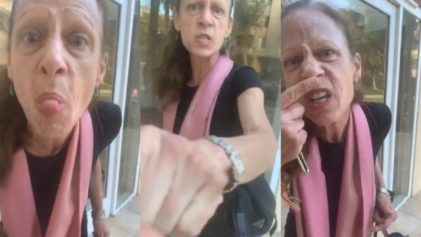For The Atlantic magazine, ex-Major League Baseball player Doug Glanville, an author, wrote the following article after he was racially profiled by Connecticut police.
It was an otherwise ordinary snow day in Hartford, Connecticut, and I was laughing as I headed outside to shovel my driveway. I’d spent the morning scrambling around, trying to stay ahead of my three children’s rising housebound energy, and once my shovel hit the snow, I thought about how my wife had been urging me to buy a snowblower. I hadn’t felt an urgent need. Whenever it got ridiculously blizzard-like, I hired a snow removal service. And on many occasions, I came outside to find that our next door neighbor had already cleared my driveway for me.
Never mind that our neighbor was an empty-nester in his late 60s with a replaced hip, and I was a former professional ballplayer in his early 40s. I kept telling myself I had to permanently flip the script and clear his driveway. But not today. I had to focus on making sure we could get our car out for school the next morning. My wife was at a Black History Month event with our older two kids. The snow had finally stopped coming down and this was my mid-afternoon window of opportunity.
Just as I was good-naturedly turning all this over in my mind, my smile disappeared.
A police officer from West Hartford had pulled up across the street, exited his vehicle, and begun walking in my direction. I noted the strangeness of his being in Hartford—an entirely separate town with its own police force—so I thought he needed help. He approached me with purpose, and then, without any introduction or explanation he asked, “So, you trying to make a few extra bucks, shoveling people’s driveways around here?”
All of my homeowner confidence suddenly seemed like an illusion.
It would have been all too easy to play the “Do you know who I am?” game. My late father was an immigrant from Trinidad who enrolled at Howard University at age 31 and went on to become a psychiatrist. My mother was an important education reformer from the South. I graduated from an Ivy League school with an engineering degree, only to get selected in the first round of the Major League Baseball draft. I went on to play professionally for nearly 15 years, retiring into business then going on to write a book and a column for The New York Times. Today, I work at ESPN in another American dream job that lets me file my taxes under the description “baseball analyst.”
But I didn’t mention any of this to the officer. I tried to take his question at face value, explaining that the Old Tudor house behind me was my own. The more I talked, the more senseless it seemed that I was even answering the question. But I knew I wouldn’t be smiling anymore that day.
After a few minutes, he headed back to his vehicle. He offered no apology, just an empty encouragement to enjoy my shoveling. And then he was gone.
***
When I moved my family to Connecticut, no relocation service, or anyone else we consulted for advice, ever mentioned Hartford as a viable option. They offered the usual suggestions for those who passed the prestige and wealth test—towns like West Hartford, Glastonbury, Avon, and Simsbury were presented as prime options. On one occasion, when I was preparing to announce a game, someone at our production meeting asked me where I lived. When I told him it was Hartford, he asked, “Really? Did you lose a bet?”
My family could have comfortably afforded a home in West Hartford. My wife is an attorney who graduated from two Ivy League schools. After time getting her legal chops in the Philadelphia public defender’s office, she worked at the Chicago law firm where Barack Obama started his legal career. As we painstakingly considered where to live, my wife fielded off-putting warnings about Hartford from well-meaning friends: “You know what they say when you cross the line…”
But we settled on the capital city of Hartford for the cultural experience. Connecticut is one of the most polarized states in the country—as people simplistically put it, “poor black and brown cities surrounded by wealthy white suburbs.” Our decision was not based on the features advisors kept mentioning—shopping centers and malls, or nice homes and “good schools.” It was about a certain kind of civic responsibility and, quite frankly, about making sure our kids saw other people who looked like them.
Our street is one block from the West Hartford border, and our Hartford neighbors make up a sort of Who’s Who of political and legal leaders. The mayor lives behind us, the Connecticut governor’s house is up the street, and a state senator lives two doors down. As soon as I told my wife what had happened, she sent the senator a furious email under the subject line “Shoveling While Black.”
Doug just got detained by West Hartford Police in front of our house while shoveling our driveway, questioning him about asking to be paid for shoveling. The officer left when Doug told him that it was his house. There were several other people on our street out in front of their houses shoveling snow at the same time. None of them were stopped for questioning. Just wanted to vent to someone whom we know cares and would be equally outraged.
Before I could even digest what happened, my wife’s email had set a machine in motion. A diverse swatch of Hartford influentials banded together to assess the situation, including the chief of police, local attorneys, and security officers from the neighborhood civic association. Within a couple of hours, I had outlined my version of events to the Hartford Police Department’s Internal Affairs Department. Most told me that I just had to decide how far I wanted to take my complaint.
Our next door neighbor (the one with the snowblower) helped my wife and me sort out the facts and figure out our options. He has a legal resume that covers a wide range of jurisprudence, from parking authorities to boards of African American–centric charter schools. He was in our living room within an hour.
The first step was to articulate exactly what the West Hartford officer had done. He’d been outside his jurisdiction—the representative from internal affairs had confirmed this. That meant a police officer from another town had come to my house, approached me while I was shoveling my own driveway, and—without any introduction—asked me a very presumptuous question.
All of this had put me in an extremely vulnerable situation. In one moment, I went from being an ordinary father and husband, carrying out a simple household chore, to a suspect offering a defense. The inquiry had forced me to check my tone, to avoid sounding smug even when I was stating the obvious: that I was shoveling the driveway because the house belonged to me.
Many people I spoke with brought up Henry Louis Gates, the noted Harvard scholar who was arrested for breaking into his own home. If I hadn’t been careful and deferential—if I’d expressed any kind of justifiable outrage—I couldn’t have been sure of the officer’s next question, or his next move. But the problem went even deeper than that. I found myself thinking of the many times I had hired a man who looked like me to shovel my driveway. Would the officer have been any more justified in questioning that man without offering an explanation? I also couldn’t help projecting into the future and imagining my son as a teenager, shoveling our driveway in my place. How could I be sure he would have responded to the officer in the same conciliatory way?
As offended as I’d been, the worst part was trying to explain the incident to my kids. When I called my wife to tell her what had happened, she was on her way home from the Black History Month event, and my son heard her end of the conversation. Right away, he wanted to know whether I’d been arrested. My 4-year-old daughter couldn’t understand why a police officer would “hurt Daddy’s feelings.” I didn’t want to make my children fear the police. I also wasn’t ready to talk to them about stop-and-frisk policies, or the value judgments people put on race.
Until that moment, skin colors had been little more than adjectives to my kids. Some members of our family have bronze or latte skin; others are caramel-colored or dark brown. Our eldest and “lightest-skinned” daughter had at times matter-of-factly described her brother and me as “brown” and herself as “white.” But that night, my wife made it painfully simple. “We are black,” she explained. “All of us.”
For the complete story, go to The Atlantic.


